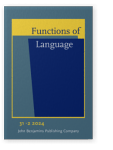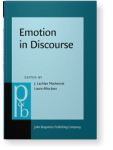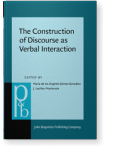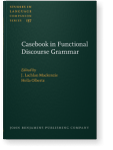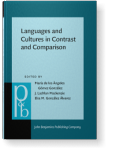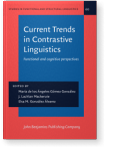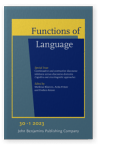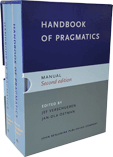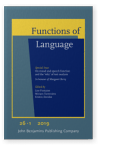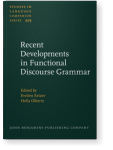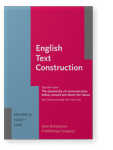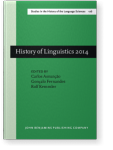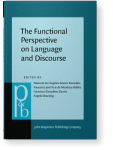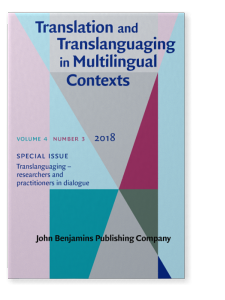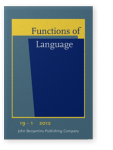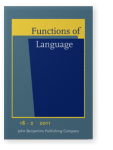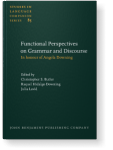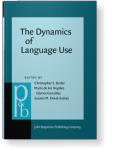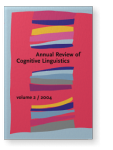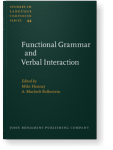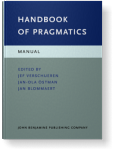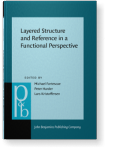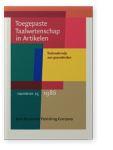J. Lachlan Mackenzie
List of John Benjamins publications for which J. Lachlan Mackenzie plays a role.
Journal
Emotion in Discourse
Edited by J. Lachlan Mackenzie and Laura Alba-Juez
[Pragmatics & Beyond New Series, 302] 2019. xi, 397 pp.
Subjects Discourse studies | Pragmatics
The Construction of Discourse as Verbal Interaction
Edited by María de los Ángeles Gómez González and J. Lachlan Mackenzie
[Pragmatics & Beyond New Series, 296] 2018. vi, 304 pp.
Subjects Discourse studies | Pragmatics | Syntax
Casebook in Functional Discourse Grammar
Edited by J. Lachlan Mackenzie and Hella Olbertz
[Studies in Language Companion Series, 137] 2013. ix, 313 pp.
Subjects Discourse studies | Functional linguistics | Pragmatics | Syntax | Theoretical linguistics
Languages and Cultures in Contrast and Comparison
Edited by María de los Ángeles Gómez González, J. Lachlan Mackenzie and Elsa M. González Álvarez
[Pragmatics & Beyond New Series, 175] 2008. xxii, 364 pp.
Subjects Comparative linguistics | Discourse studies | Pragmatics | Typology
Current Trends in Contrastive Linguistics: Functional and cognitive perspectives
Edited by María de los Ángeles Gómez González, J. Lachlan Mackenzie and Elsa M. González Álvarez
[Studies in Functional and Structural Linguistics, 60] 2008. xxi, 333 pp.
Subjects Comparative linguistics | Functional linguistics | Theoretical linguistics
2023 Editorial announcement Continuative and contrastive discourse relations across discourse domains: Cognitive and cross-linguistic approaches, Klumm, Matthias, Anita Fetzer and Evelien Keizer (eds.), pp. 1–3 | Editorial
2022 Functional grammar Handbook of Pragmatics: Manual, Verschueren, Jef and Jan-Ola Östman (eds.), pp. 625–633 | Chapter
2019 Chapter 1. Emotion processes in discourse Emotion in Discourse, Mackenzie, J. Lachlan and Laura Alba-Juez (eds.), pp. 3–26 | Chapter
This chapter contextualizes the book as a whole, surveying the study of emotion in discourse and presenting our own view and definition of the phenomenon. We show how functional, cognitive and social linguistic approaches to discourse analysis, in what is labeled the ‘emotional turn’, have ceased… read more
2019 Preface On mood and speech function and the ‘why’ of text analysis: In honour of Margaret Berry, Fontaine, Lise, Miriam Taverniers and Kristin Davidse (eds.), pp. 1–4 | Editorial
2019 Chapter 3. The syntax of an emotional expletive in English Emotion in Discourse, Mackenzie, J. Lachlan and Laura Alba-Juez (eds.), pp. 55–86 | Chapter
Various linguists have identified linguistic phenomena that express emotions rather than purely ideational or discursive meanings. From the viewpoint of Functional Discourse Grammar (FDG) adopted here, emotion is visible above all as an overlay on structures that communicate interpersonal and… read more
2018 Introduction: How is discourse constructed and evaluation achieved in verbal interaction? The Construction of Discourse as Verbal Interaction, Gómez González, María de los Ángeles and J. Lachlan Mackenzie (eds.), pp. 1–10 | Introduction
2018 Negation in Functional Discourse Grammar Recent Developments in Functional Discourse Grammar, Keizer, Evelien and Hella Olbertz (eds.), pp. 17–46 | Chapter
The purpose of this chapter is to show that the model of Functional Discourse Grammar can be used to provide a detailed classification of expressions of negation by taking its hierarchical, layered structure as the point of departure. The chapter thus follows up on ideas first launched in Dik… read more
2016 Dynamicity and dialogue: Perspectives from Functional Discourse Grammar The dynamicity of communication below, around and above the clause, Clarke, Ben and Jorge Arús-Hita (eds.), pp. 56–76 | Article
The article surveys how Functional Discourse Grammar (FDG; Hengeveld & Mackenzie 2008) has responded to Simon Dik’s call for a functional grammar to have ‘psychological adequacy’ and draws parallels to similar initiatives from other approaches. After a brief history of what has later come to be… read more
2016 A first history of Functional Grammar History of Linguistics 2014: Selected papers from the 13th International Conference on the History of the Language Sciences (ICHoLS XIII), Vila Real, Portugal, 25–29 August 2014, Assunção, Carlos, Gonçalo Fernandes and Rolf Kemmler (eds.), pp. 233–246 | Article
The history is told of Functional Grammar (FG), as developed by Simon C. Dik (1940–1995) of the University of Amsterdam and his co-workers. The presentation covers the genesis of the theory, its international recognition, the early death of its originator and main protagonist as well as Dik’s… read more
2014 Besides as a connective The Functional Perspective on Language and Discourse: Applications and implications, Gómez González, María de los Ángeles, Francisco José Ruiz de Mendoza Ibáñez, Francisco Gonzálvez-García and Angela Downing (eds.), pp. 223–242 | Article
This chapter throws new light upon besides as a connective in contemporary
English. Using examples extracted from corpora, we consider how to reconcile
the notions of “tangentiality” and “decisiveness” found in existing descriptions
of its function. After an assessment of the only previous… read more
2014 Grammar and context in Functional Discourse Grammar The interaction between context and grammar in Functional Discourse Grammar, Alturo, Nuria, Evelien Keizer and Lluís Payrató (eds.), pp. 203–227 | Article
This article presents a proposal for the organization of the Contextual Component in Functional Discourse Grammar. A guiding principle in this proposal is that, given the fact that Functional Discourse Grammar is a theory of grammar, the Contextual Component should provide the information that is… read more
2014 The contextual component in a dialogic FDG The interaction between context and grammar in Functional Discourse Grammar, Alturo, Nuria, Evelien Keizer and Lluís Payrató (eds.), pp. 249–273 | Article
Functional Discourse Grammar (FDG) has to date been explicitly oriented to modelling the grammar of the individual speaker, with the Contextual Component being seen as supportive. If FDG is re-interpreted as dialogic, the Contextual Component emerges as being shared by all interactants in the… read more
2013 Spatial adpositions between lexicon and grammar Casebook in Functional Discourse Grammar, Mackenzie, J. Lachlan and Hella Olbertz (eds.), pp. 67–94 | Article
This chapter presents an FDG analysis of spatial adpositions, showing that they divide into two classes, lexical and grammatical. Lexical adpositions are primitives that feed into formulation, whereas grammatical adpositions are primitives at encoding, realizing semantic functions from the… read more
2013 Introduction Casebook in Functional Discourse Grammar, Mackenzie, J. Lachlan and Hella Olbertz (eds.), pp. 1–14 | Article
2012 Review of Smirnova & Mortelmans (2010): Funktionale Grammatik: Konzepte und Theorien Functions of Language 19:1, pp. 119–125 | Review
2008 Introduction Current Trends in Contrastive Linguistics: Functional and cognitive perspectives, Gómez González, María de los Ángeles, J. Lachlan Mackenzie and Elsa M. González Álvarez (eds.), pp. xv–xxi | Miscellaneous
2008 The contrast between pronoun position in European Portuguese and Castilian Spanish: An application of Functional Grammar Current Trends in Contrastive Linguistics: Functional and cognitive perspectives, Gómez González, María de los Ángeles, J. Lachlan Mackenzie and Elsa M. González Álvarez (eds.), pp. 51–75 | Article
Cast in Functional Grammar (FG), this chapter considers the syntactic placement of pronominal clitics in European Portuguese (EP), contrasting these with comparable phenomena in Castilian Spanish (CS). It emerges that EP constituent order results from the interplay of (at least) a single, minimally… read more
2007 Double-possessive nominalizations in English Functional Perspectives on Grammar and Discourse: In honour of Angela Downing, Butler, Christopher S., Raquel Hidalgo Downing and Julia Lavid-López (eds.), pp. 217–232 | Article
Double-possessive nominalizations such as Iraq’s invasion of Kuwait have played a prominent role in the history of linguistics. However, this construction is not only cross-linguistically rare but also the least used form of nominalization in English texts. The question is therefore addressed of… read more
2005 Incremental Functional Grammar and the language of football commentary The Dynamics of Language Use: Functional and contrastive perspectives, Butler, Christopher S., María de los Ángeles Gómez González and Susana M. Doval-Suárez (eds.), pp. 113–128 | Article
2004 An acquisitional approach to disharmonic word-order/affixation pairings Annual Review of Cognitive Linguistics: Volume 2, Ruiz de Mendoza Ibáñez, Francisco José (ed.), pp. 31–71 | Article
Various proposals have been put forward to explain the typological skewing produced by the universal preference for suffixing as opposed to prefixing. These proposals have focused either on processing or on diachronic explanations (or a combination of both). In the present paper it is argued that a… read more
2003 Predicates and predication Handbook of Pragmatics: 2001 Installment, Verschueren, Jef, Jan-Ola Östman, Jan Blommaert † and Chris Bulcaen (eds.), pp. 1–22 | Article
1998 The basis of syntax in the holophrase Functional Grammar and Verbal Interaction, Hannay, Mike and A. Machtelt Bolkestein (eds.), pp. 267–296 | Article
1995 Functional grammar Handbook of Pragmatics: Manual, Verschueren, Jef, Jan-Ola Östman and Jan Blommaert † (eds.), pp. 286–293 | Article
1992 Places and Things Layered Structure and Reference in a Functional Perspective: Papers from the Functional Grammar Conference, Copenhagen, 1990, Fortescue, Michael, Peter Harder and Lars Kristoffersen (eds.), pp. 253–276 | Article
1991 On assigning pragmatic functions in English Pragmatics 1:2, pp. 169–215 | Article
This paper presents a discussion of the treatment of the pragmatic functions Topic and Focus in Functional Grammar (Dik: 1989, ch. 13). Two questions will be addressed: (a) the theoretical question of how the interface between the static grammar (dealing with a discourse as the product of… read more
1986 Advanced Writing Skills and the Role of the Sentence Taalonderwijs aan gevorderden, pp. 73–83 | Article
